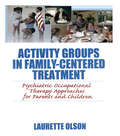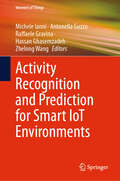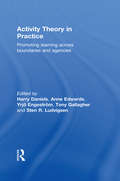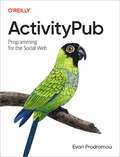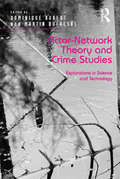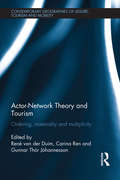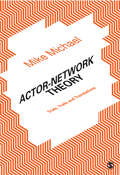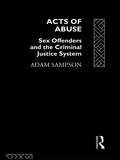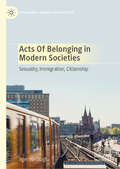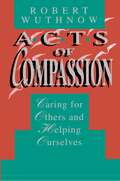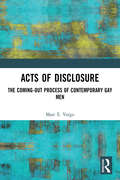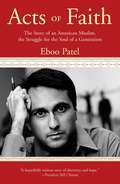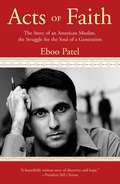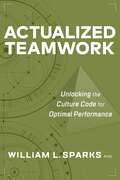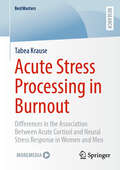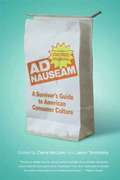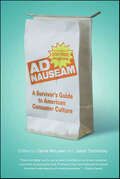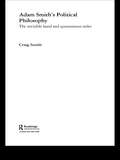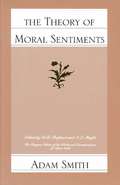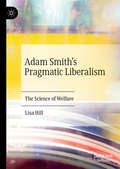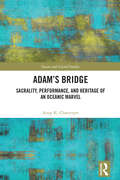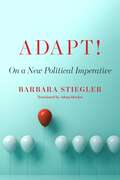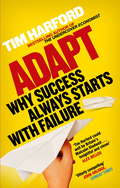- Table View
- List View
Activity Groups in Family-Centered Treatment: Psychiatric Occupational Therapy Approaches for Parents and Children
by Laurette OlsonGet the tools for practical family-based interventions for children or adolescents with mental illness Providing parent-child occupation-based interventions can be one of the most important therapeutic services offered to children or parents with mental illness and their families. Activity Groups in Family-Centered Treatment: Psychiatric Occupational Therapy Approaches for Parents and Children provides useful in depth "how to" strategies into the processes of providing family occupation-based group intervention when a child has a mental illness. Occupational therapists working with children or parents with mental illness can learn valuable practical interventions to apply in their own clinical work.Cherished activities that strengthen parent-child bonds are many times lacking in families that include a child or parent with mental illness. Activity Groups in Family-Centered Treatment describes valuable parent-child occupation-based interventions with detailed examples of how they have been provided in therapy. This text provides an overview of the literature related to providing family-based psychiatric OT treatment for children and their families, a framework for providing services, rich descriptions of a parent-child activity group, a parent-adolescent activity group, and case studies of inpatient and home-based occupation based interventions.Topics in Activity Groups in Family-Centered Treatment include: an overview of theory and research literature on the nature of the interaction between parents and children with emotional disorders detailed case studies of family challenges with mental illness a framework for parent-child activity groups a qualitative study of a parent-child activity group analysis of the barriers that can arise in a parent-child activity group clinical experiences leading a parent-adolescent activity group analysis of the influences of culture within a parent-child activity group a case study of the intervention for a depressed mother and her family issues between parents and professionals when children are psychiatrically hospitalizedActivity Groups in Family-Centered Treatment provides occupational therapists and other professionals who lead parent-child groups or who work with families that include a child or parent with mental illness with integral tools to effectively treat their clients.
Activity Recognition and Prediction for Smart IoT Environments (Internet of Things)
by Raffaele Gravina Zhelong Wang Michele Ianni Antonella Guzzo Hassan GhasemzadehThis book provides the latest developments in activity recognition and prediction, with particular focus on the Internet of Things. The book covers advanced research and state of the art of activity prediction and its practical application in different IoT related contexts, ranging from industrial to scientific, from business to daily living, from education to government and so on. New algorithms, architectures, and methodologies are proposed, as well as solutions to existing challenges with a focus on security, privacy, and safety. The book is relevant to researchers, academics, professionals and students.
Activity Theory in Practice: Promoting Learning Across Boundaries and Agencies
by Anne Edwards Harry Daniels Yrjö Engeström Tony Gallagher Sten R. LudvigsenThis ground-breaking book brings together cutting-edge researchers who study the transformation of practice through the enhancement and transformation of expertise. This is an important moment for such a contribution because expertise is in transition - moving toward collaboration in inter-organizational fields and continuous shaping of transformations. To understand and master this transition, powerful new conceptual tools are needed and are provided here. The theoretical framework which has shaped these studies is Cultural Historical Activity Theory (CHAT). CHAT analyses how people and organisations learn to do something new, and how both individuals and organisations change. The theoretical and methodological tools used have their origins in the work of Lev Vygotsky and A.N. Leont’ev. In recent years this body of work has aroused significant interest across the social sciences, management and communication studies. Working as part of an integrated international team, the authors identify specific findings which are of direct interest to the academic community, such as: the analysis of vertical learning between operational and strategic levels within complex organizations; the refinement of notions of identity and subject position within CHAT; the introduction of the concept of ‘labour power’ into CHAT; the development of a method of analysing discourse which theoretically coheres with CHAT and the design of projects. Activity Theory in Practice will be highly useful to practitioners, researchers, students and policy-makers who are interested in conceptual and empirical issues in all aspects of ‘activity-based’ research.
ActivityPub: Programming for the Social Web
by Evan ProdromouActivityPub is the new standard for connecting social networks together on the social web. This open, decentralized social networking protocol defines an API for sharing activities to a social network and a procedure that servers use to distribute those activities to a subscriber's feed. With this book, you'll learn how to assemble ActivityPub-enabled clients for making new kinds of social apps on top of existing networks and build ActivityPub servers that create new human or automated accounts on the social web.With those skills under your belt, you can explore other applications of this publish-subscribe technology: content management systems, internet of things, and enterprise automation. With hands-on examples and in-depth knowledge from Evan Prodromou, one of the authors of the protocol, this is the ActivityPub handbook that every social software hacker needs.Learn what the social web is and what ActivityPub doesRepresent social network data in the Activity Streams 2.0 formatWrite a simple ActivityPub client and serverExtend ActivityPub's functionality with new typesFind in-depth details about the more obscure ActivityPub data structuresEvan Prodromou is a coauthor of the ActivityPub protocol and the Activity Streams 2.0 data format.
Actor-Network Theory and Crime Studies: Explorations in Science and Technology
by Dominique Robert Martin DufresneDeveloped by Bruno Latour and his collaborators, actor-network theory (ANT) offers crimes studies a worthy intellectual challenge. It requires us to take the performativity turn, consider the role of objects in our analysis and conceptualize all actants (human and non-human) as relational beings. Thus power is not the property of one party, but rather it is an effect of the relationships among actants. This innovative collection provides a series of empirical and theoretical contributions that shows: ¢ The importance of conceptualizing and analyzing technologies as crucial actants in crime and crime control. ¢ The many facets of ANT: its various uses, its theoretical blending with other approaches, its methodological implications for the field. ¢ The fruitfulness of ANT for studying technologies and crime studies: its potential and limitations for understanding the world and revamping crime studies research goals. Students, academics and policy-makers will benefit from reading this collection in order to explore criminology-related topics in a different way.
Actor-Network Theory and Tourism: Ordering, Materiality and Multiplicity (Contemporary Geographies of Leisure, Tourism and Mobility)
by René van der Duim Carina Ren Gunnar Thór JóhannessonThe recent surfacing of actor-network theory (ANT) in tourism studies correlates to a rising interest in understanding tourism as emergent thorough relational practice connecting cultures, natures and technologies in multifarious ways. Despite the widespread application of ANT across the social sciences, no book has dealt with the practical and theoretical implications of using ANT in Tourism research. This is the first book to critically engage with the use of ANT in tourism studies. By doing so, it challenges approaches that have dominated the literature for the last twenty years and casts new light on issues of materiality, ordering and networks in tourism. The book describes the approach, its possibilities and limitations as an ontology and research methodology, and advances its use and research in the field of tourism.The first three chapters of the book introduce ANT and its key conceptual premises, the book itself and the relation between ANT and tourism studies. Using illustrative cases and examples, the subsequent chapters deal with specific subject areas like materiality, risk, mobilities and ordering and show how ANT contributes to tourism studies. This part presents examples and cases which illustrate the use of the approach in a critical way. Inherently, the study of tourism is a multi-disciplinary field of research and that is reflected in the diverse academic backgrounds of the contributing authors to provide a broad post-disciplinary context of ANT in tourism studies. This unique book, focusing on emerging approaches in tourism research, will be of value to students, researchers and academics in tourism as well as the wider Social Sciences.
Actor-Network Theory: Trials, Trails and Translations
by Mike MichaelIn this thought-provoking and engaging book, Mike Michael brings us a powerful overview of Actor-Network Theory. Covering a breadth of topics, Michael demonstrates how ANT has become a major theoretical framework, influencing scholarly work across a range of fields. Critical and playful, this book fills a notable gap in the literature as Michael expertly explicates the theory and demonstrates how its key concepts can be applied. Comparing and contrasting ANT with other social scientific perspectives, Michael provides a robust and reflexive account of its analytic and empirical promise. A perfect companion for any student of Science and Technology Studies, Sociology, Geography, Management & Organisation Studies, Media & Communication, and Cultural Studies.
Actor-Network Theory: Trials, Trails and Translations
by Mike MichaelIn this thought-provoking and engaging book, Mike Michael brings us a powerful overview of Actor-Network Theory. Covering a breadth of topics, Michael demonstrates how ANT has become a major theoretical framework, influencing scholarly work across a range of fields. Critical and playful, this book fills a notable gap in the literature as Michael expertly explicates the theory and demonstrates how its key concepts can be applied. Comparing and contrasting ANT with other social scientific perspectives, Michael provides a robust and reflexive account of its analytic and empirical promise. A perfect companion for any student of Science and Technology Studies, Sociology, Geography, Management & Organisation Studies, Media & Communication, and Cultural Studies.
Acts of Abuse: Sex Offenders and the Criminal Justice System
by Adam SampsonSexual crime is a topic of massive public concern. Yet the debate over its causes and the appropriate responses of the criminal justice system is often fuelled by ignorance and prejudice, with little understanding of the reality of sexual crime.Acts of Abuse explores the response of the criminal justice system to this important issue. Its author, Adam Sampson, examines the existing research about the causes of rape and child abuse, the number of offences being committed, and the policy of the courts. He then examines in detail the responses of the probation service and the prison system to the increased number of offenders with which they are being required to deal.Written by a prominent critic of the British penal system, this is the first comprehensive survey of the phenomenon of sexual crime in the British penal context. It will appeal to students and all those with an interest in issues relating to crime and justice.
Acts of Belonging in Modern Societies: Sexuality, Immigration, Citizenship (Citizenship, Gender and Diversity)
by Ilgın YörükoğluThis book examines the ways in which the need to belong manifests itself in the post 9/11 world, from a cross-disciplinary perspective. Using queer Turkish women in Berlin as its subjects, the book shows how individuals with seemingly contradictory belongings develop strategies of emotional survival in the face of conflict, which Yorukoglu terms “acts of belonging”. It studies the impact of populist discourses on minorities, exploring concepts such as security, integration, sexual tolerance and cohesion within a causal relationship. Questioning this assumed relationship, the book proposes an alternative approach to study belonging. Acts Of Belonging in Modern Societies supports the empirical research behind the argument that cohesion is not a "sine qua non" of belonging. These acts allow the individual to claim belonging in spite of possible differences. The book provides evocative case studies to reveal the affective, dynamic, complex nature of human connectedness.
Acts of Compassion: Caring for Others and Helping Ourselves
by Robert WuthnowRobert Wuthnow finds that those who are most involved in acts of compassion are no less individualistic than anyone else--and that those who are the most intensely individualistic are no less involved in caring for others.
Acts of Consciousness
by Guy SaundersDrawing on compelling material from research interviews with former hostages and political prisoners, Guy Saunders reworks three classic thought experiment stories: Parfit's 'Teleporter', Nagel's 'What is it like to be a bat?' and Jackson's 'Mary the colour scientist' to form a fresh look at the study of consciousness. By examining consciousness from a social psychology perspective, Saunders develops a 'cubist psychology of consciousness' through which he challenges the accepted wisdom of mainstream approaches by arguing that people can act freely. What makes 'cubist psychology' is both the many examples taken from different viewpoints and the multiple ways of looking at the key issues of person, mind and world. This is a unique and engaging book that will appeal to students and academics in the field of consciousness studies and other readers with an interest in consciousness.
Acts of Disclosure: The Coming-Out Process of Contemporary Gay Men
by Marc E. VargoConfronting the psychological, social, sexual, legal, and political issues at stake in the coming-out process, Acts of Disclosure: The Coming-Out Process of Contemporary Gay Men uses research findings and first-hand accounts to help gay adolescents and men accept and embrace their sexual identity as an integral part of their being. Offering helpful advice and specific suggestions that will guide you through the coming-out process, this text also teaches family, friends, and colleagues how they can support and encourage you in this challenge.A roadmap through the confusing process of coming to terms with your sexuality both privately and publicly, Acts of Disclosure walks you step-by-step through the stages of coming out, the emotions involved, the potential pitfalls, and the kinds of receptions you may meet. It points out both healthy and self-destructive coping strategies and teaches you how to take responsibility for your sexuality. You will find its discussions straightforward, honest, and direct, as it broaches the following topics: coming out in American schools expressing your sexual identity on the job the harmful effects of involuntary public exposure why some parents adjust better than others to the fact that they have a gay child the damaging effects of social myths attached to homosexuality the emotional and behavioral reactions wives have after discovering that their husbands are gay how to anticipate a possible “outing” against oneself and the advantages of coming out to prevent such an act compulsory social programming that may be deeply injurious to gay adolescents disclosing your sexual identity after the onset of AIDSGay males of all ages, parents, friends, children, therapists, psychologists, social workers, and educators who read Acts of Disclosure will realize their error in treating gay sexual identity as undesirable, shameful, or second-rate. As you turn the last page of this comprehensive and enlightening book, you will likely find yourself with an appreciation of gay male sexuality as well as with a better understanding of the complexities of human nature.
Acts of Faith: The Story of an American Muslim, the Struggle for the Soul of a Generation
by Eboo PatelPatel (founder and executive director, Interfaith Youth Core, "a Chicago-based international nonprofit building the interfaith youth movement") is an Indian Muslim who grew up outside of Chicago. In this memoir, he explores the evolution of his own religious and cultural identity as he gradually came to reject anger at being excluded from mainstream American society in order to promote interfaith awareness with a focus on younger generations.
Acts of Faith: The Story of an American Muslim, the Struggle for the Soul of a Generation
by Eboo PatelActs of Faith is a remarkable account of growing up Muslim in America and coming to believe in religious pluralism, from one of the most prominent faith leaders in the United States. Eboo Patel's story is a hopeful and moving testament to the power and passion of young people-and of the world-changing potential of an interfaith youth movement.
Actualized Teamwork: Unlocking the Culture Code for Optimal Performance
by William L. SparksWhy do some teams thrive while others stall? The answer lies in team culture and the emotional dynamics that shape it.In Actualized Teamwork, bestselling author Will Sparks introduces the concept of "team-actualization" and provides a research-backed framework for diagnosing and improving team performance. The book presents a clear, evidence-based methodology to assess culture, strengthen communication, build trust and increase engagement. Readers will discover the 5 Dimensions of Teamwork and learn practical strategies for enhancing each, supported by tools and examples from real teams.Accessible and actionable, this book includes a free team assessment and is an essential guide for leaders seeking to unlock the full potential of their teams.
Acute Stress Processing in Burnout: Differences in the Association Between Acute Cortisol and Neural Stress Response in Women and Men (BestMasters)
by Tabea KrauseThis book is the first to investigate sex-specific associations between cortisol increase and neural stress processing in individuals with burnout symptoms. How do women and men with burnout symptoms respond differently to stress? Using functional MRI and the ScanSTRESS paradigm, differences in brain activity and functional connectivity of the amygdala and hippocampus were analyzed. Men showed higher cortisol levels and a positive correlation between cortisol increase and hippocampal activity, whereas in women, this correlation was negative. The results suggest distinct stress processing mechanisms in women and men, even within the same brain structures. The study provides important insights for individualized burnout research, emphasizing the relevance of biological sex differences.
Ad Nauseam: A Survivor's Guide to American Consumer Culture
by Carrie McLaren Jason TorchinskyWith the style and irreverence of Vice magazine and the critique of the corporatocracy that made Naomi Klein's No Logo a global hit, the cult magazine Stay Free!—long considered the Adbusters of the United States—is finally offering a compendium of new and previously published material on the impact of consumer culture on our lives. The book questions, in the broadest sense, what happens to human beings when their brains are constantly assaulted by advertising and corporate messages. Most people assert that advertising is easily ignored and doesn't have any effect on them or their decision making, but Ad Nauseam shows that consumer pop culture does take its toll. <p><p> In an engaging, accessible, and graphically appealing style, Carrie McLaren and Jason Torchinsky (as well as contributors such as David Cross, The Onion's Joe Garden, The New York Times's Julie Scelfo, and others) discuss everything from why the TV program CSI affects jury selection, to the methods by which market researchers stalk shoppers, to how advertising strategy is like dog training. The result is an entertaining and eye-opening account of the many ways consumer culture continues to pervade and transform American life.
Ad Nauseam: A Survivor's Guide to American Consumer Culture
by Carrie McLaren and Jason TorchinskyWith the style and irreverence of Vice magazine and the critique of the corporatocracy that made Naomi Klein's No Logo a global hit, the cult magazine Stay Free!—long considered the Adbusters of the United States—is finally offering a compendium of new and previously published material on the impact of consumer culture on our lives. The book questions, in the broadest sense, what happens to human beings when their brains are constantly assaulted by advertising and corporate messages. Most people assert that advertising is easily ignored and doesn't have any effect on them or their decision making, but Ad Nauseam shows that consumer pop culture does take its toll.In an engaging, accessible, and graphically appealing style, Carrie McLaren and Jason Torchinsky (as well as contributors such as David Cross, The Onion's Joe Garden, The New York Times's Julie Scelfo, and others) discuss everything from why the TV program CSI affects jury selection, to the methods by which market researchers stalk shoppers, to how advertising strategy is like dog training. The result is an entertaining and eye-opening account of the many ways consumer culture continues to pervade and transform American life.
Adam Smith's Political Philosophy: The Invisible Hand and Spontaneous Order (Routledge Studies in Social and Political Thought #Vol. 42)
by Craig SmithWhen Adam Smith published his celebrated writings on economics and moral philosophy he famously referred to the operation of an 'invisible hand'. Adam Smith’s Political Philosophy makes visible this hand by examining its significance in Smith’s political philosophy and relating it to similar concepts used by other philosophers, thus revealing a distinctive approach to social theory that stresses the importance of the unintended consequences of human action. The first book to examine the history of Smith’s political philosophy from this perspective, this work introduces greater conceptual clarity to the discussion of the invisible hand and the related notion of unintended order in the work of Smith, as well as in political theory more generally. By examining the application of spontaneous order ideas in the work of Smith, Hume, Hayek and Popper, this important volume traces similarities in approach, and from these constructs a conceptual, composite model of an invisible hand argument. While setting out a clear framework of the idea of spontaneous order, the book also builds the case for using this as an explanatory social theory, with chapters on its application in the fields of science, moral philosophy, law and government.
Adam Smith: The Theory of Moral Sentiments
by Adam Smith D. D. Raphael A. L. MacfieMan's moral nature is influenced by sentiment and sympathy. The human ability to sympathize forms the psychological basis of man's desire to adhere to natural moral laws. Adam Smith explores ideas about individual freedom and self-interest, conscience and virtue, and a classic work of moral philosophy that remains relevant.
Adam Smith’s Pragmatic Liberalism: The Science of Welfare
by Lisa HillAdam Smith is commonly conceived as either an economist or a moral philosopher so his importance as a political thinker has been somewhat neglected and, at times, even denied. This book reveals the integrated, deeply political project that lies at the heart of Smith’s thought, showing both the breadth and novelty of Smith’s approach to political thought. A key argument running through the book is that attempts to locate Smith on the left-right spectrum (however that was interpreted in the eighteenth century) are mistaken: his position was ultimately dictated by his social scientific and economic thought rather than by ideology or principle. Through examining Smith’s political interests and positions, this book reveals that apparent tensions in Smith's thought are generally a function of his willingness to abandon, not only proto-liberal principles, but even the principles of his own social science when the achievement of good outcomes was at stake. Despite the common perception, negative liberty was not the be-all and end-all for Smith; rather, welfare was his main concern and he should therefore be understood as a thinker just as interested in what we would now call positive liberty. The book will uniquely show that Smith’s approach was basically coherent, not muddled, ad hoc, or ‘full of slips’; in other words, that it is a system unified by his social science and his practical desire to maximise welfare.
Adam’s Bridge: Sacrality, Performance, and Heritage of an Oceanic Marvel (Ocean and Island Studies)
by Arup K. ChatterjeeAdam’s Bridge offers the first comprehensive transdisciplinary study of the famous eponymous tombolo (also known as Ram Setu) combining its sacral, historical, geological, political, performative, and heritage aspects into one framework, viewed under the critical lenses of island studies and cultural theory. The book elucidates the entanglement of Adam’s Bridge’s discursive history with India’s colonial history, contemporary geology, domestic politics, and the nation’s emerging position in a complex geopolitical order in and around the Indian Ocean region, vis-à-vis increasing Sino-American involvement in Indo-Sri Lankan relations. Without foregrounding any absolute scientific claims on the location of the sandbars that inspired sage Valmiki’s Ram Setu and the Ramayan legacy or hindering narratives of religious faiths and folklore revolving around the structure, this intellectual historiography traces the parallel evolution of traditions of compassionate questioning and devotion for Indic sacred beliefs among commentators across the millennia from both Indian and non-Indian spectra, seen in juxtaposition with the biotic and abiotic diversity of the Gulf of Mannar and Palk Bay. Looking beyond secular-versus-religious debates, this book will be of interest to scholars of ocean and island studies, coastal economies, archipelagic geographies, environmental history, heritage studies, colonial studies, and cultural theory. Adam’s Bridge unifies a consortium of themes, ranging across ecological and livelihood sustainability, environmentalism, soteriology, economic and geostrategic history, and the United Nations Convention on the Law of the Sea, in conceptualizing a compellingly nuanced chronicle for India’s enchanted ‘bridge.’
Adapt!: On a New Political Imperative
by Barbara StieglerWinner, French Voices AwardThis book, a crossover hit in France, offers a fresh genealogy of our neoliberal moment.“We must adapt!” These words can be heard almost everywhere and in every aspect of our lives. Where does this widespread sense that we have fallen behind come from? How can we explain this progressive colonization of the economic, social, and political fields by this biological vocabulary of evolution? Offering a lucid account of sophisticated material, Barbara Stiegler uncovers the prehistories of today’s ubiquitous rhetoric in Darwinism and American liberalism, while, at the same time, recovering powerful resistances to the rhetoric of adaptation across the twentieth century.Walter Lippmann, an American theorist of this new liberalism, believed democracy was not adapted to the needs of globalization. Only a government of experts could force society to evolve, he argued. Lippmann thus found himself confronted with John Dewey, the great figure of American Pragmatism. Both Lippmann and Dewey labored under the impression that the world had changed and society needed to adapt. However, Lippmann did not trust society to adapt on its own and insisted on the need for experts who would force the necessary adaptation. Dewey, by contrast, believed the necessary adaptation could only come "from below" and should proceed in a democratic fashion. Focusing on readings of Michel Foucault, Walter Lippmann, and John Dewey, Adapt! paves the way for renewed insights into neoliberalism’s history, essence, characteristic forces, and impacts, as well as biopolitical theory. Stiegler presents an intriguing new genealogy for the development of neoliberalism, examining whether humans are by nature lagging and require biopolitical and disciplinary management to enforce adaptation. Stiegler also reorients Foucault’s genealogy of neoliberalism by emphasizing the Darwinian rhetoric of adaptation, as it arose in the Lippmann–Dewey Debate, and deftly handles the question of human nature in a way that re-enlivens this traditional concept. As the industrialization of our ways of life never stops destroying the environment and the health of organisms (climate disruption, the destruction of biodiversity, the growth of chronic diseases, the return of large pandemics), how can we think of a democratic government of life and the living? This is the question that Stiegler’s work helps us to confront.
Adapt: Why Success Always Starts with Failure
by Tim HarfordEverything we know about solving the world's problems is wrong. Out: Plans, experts and above all, leaders. In: Adapting - improvise rather than plan; fail, learn, and try againIn this groundbreaking new book, Tim Harford shows how the world's most complex and important problems - including terrorism, climate change, poverty, innovation, and the financial crisis - can only be solved from the bottom up by rapid experimenting and adapting.From a spaceport in the Mojave Desert to the street battles of Iraq, from a blazing offshore drilling rig to everyday decisions in our business and personal lives, this is a handbook for surviving - and prospering - in our complex and ever-shifting world.
